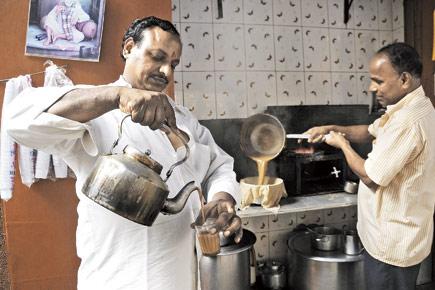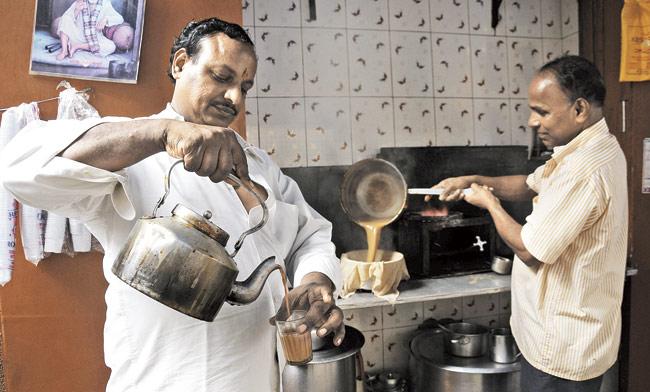Last week The Hindu newspaper allegedly issued a circular stating that employees could not carry non-vegetarian food into the common canteen, because it made the majority vegetarians feel uncomfortable.

Tea is one of the unifying factors in India. Pic for representational purpose only
![]() Last week The Hindu newspaper allegedly issued a circular stating that employees could not carry non-vegetarian food into the common canteen, because it made the majority vegetarians feel uncomfortable. The editor responded to criticism by tweeting that a private organisation makes its own rules.
Last week The Hindu newspaper allegedly issued a circular stating that employees could not carry non-vegetarian food into the common canteen, because it made the majority vegetarians feel uncomfortable. The editor responded to criticism by tweeting that a private organisation makes its own rules.

Tea is one of the unifying factors in India. Pic for representational purpose only
ADVERTISEMENT
I once made a film about South Mumbai vegetarian societies: buildings that do not allow any non-vegetarian food on the premises. Vegetarian residents said it’s not that they were intolerant. It’s just that ‘the smells are very strong, and so we find it unbearable.’ (Their tolerance was doubtful though as they were lobbying to declare the entire area of Walkeshwar a vegetarian precinct, meaning no shops or restaurants selling meat.)
To the irritation of my liberal friends, I felt a little confused about the issue. The reason? I hate tea. I have never drunk it in my life.
People rightly ask me how I know I hate it if I’ve never drunk it. My only answer is, ever since I can remember, the sight and smell of tea make my stomach churn. Might be some pichhle janam ka issue. But which Indian can escape this smell, that too in a dense, stacked city like Mumbai?
So, I understand that ‘it’s unbearable’ wala feeling. But, well, I’ve learned not to make a face, but to hold my breath while passing a tea stall. I’ve learned to breathe shallow, while friends drink their cutting chai because I want to hang out with them. I never used to serve tea at home, but it felt unfair to houseguests.
So now, out of hospitality, I ask them to make it for themselves, while I sit a little far away. It’s fine. I have survived the smells and teasing though I’m still unable to make myself drink tea. It’s what you do when you live with diverse people — you figure out how to cope with differences.
My question about how to resolve these issues of private preferences and co-existence was answered, ironically by a Mr Shah, head of the Vegetarians Society of India, who also ran a law firm. He said, ‘ I don’t serve meat at home, yes. But in office — I don’t ask who brings what. Because an office is a space where many people come for a common purpose — to work. One person’s preferences cannot determine the nature of the common space.”
A privately-owned workspace also has a public nature. To censor other people’s tiffin in an office canteen implies that vegetarians are incapable of tolerating difference. I’d be offended by that implication if I were a vegetarian! Passing such an order, without the discussion with non-vegetarians, endorses notions of purity and superiority, which bear more than passing resemblance to casteism.
The same smell emanated when Navayana, a publisher whose focus is Dalit issues, cancelled their contract to publish a translation of Tamil writer Joe D’Cruz’s book Ocean Ringed World. The reason — he supports Narendra Modi for Prime Minister. Since Navayana can’t (you may say, understandably) bear Modi’s politics, even though the book itself does not endorse fascism or Modi, the book has become untouchable for them.
The enterprise of democracy is a difficult one, defying neatness and control. The fundamentalist’s response is to insist on a doctrinaire homogeneity — like the Hindu Right would convert the heterogenous practice of Hinduism to the flattened majoritarianism of Hindutva. It is this tendency that makes Modi’s followers too, among the most intolerant of debate and difference.
If we believe in freedom and diversity, we need to uphold those values ourselves or accept our own contribution to their erosion.
Paromita Vohra is an award-winning Mumbai-based filmmaker, writer and curator working with fiction and non-fiction. Reach her at www.parodevi.com.
The views expressed in this column are the individual’s and don’t represent those of the paper.
 Subscribe today by clicking the link and stay updated with the latest news!" Click here!
Subscribe today by clicking the link and stay updated with the latest news!" Click here!







